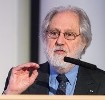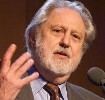Lord Puttnam attacks BBC for “criminal act” of failing to take "idiot" Boris Johnson to task for contradictory EU message
The Labour Peer says the BBC and other broadcasters missed a golden chance to embarrass the politician over a 2006 programme in which he appeared to contradict his Leave campaign message by backing Turkey’s accession to the EU
Broadcasting grandee Lord Puttnam has taken British broadcasters to task for failing to highlight contradictory comments made by Tory Leave campaigner Boris Johnson in which he promoted Turkey’s future in Europe.
Delivering his report on the future of Public Service Broadcasting in London today, the Labour Peer said he had notified his own party’s leadership as well as BBC director general Lord Hall and Channel 4 about a segment in Johnson’s BBC documentary The Dream of Rome which supported Turkish accession.
He drew particular attention to the clip below, saying that it contradicted a central message of the Leave campaign that Turkish membership was likely and would be detrimental to British interests.
In his 2006 film, The Dream of Rome, Johnson strongly made the case for Turkey to be admitted to the EU and said he could not wait for the “great moment” when the two halves of the Roman Empire “are at last reunited in an expanded European Union”.
“I believe our generation has a historic chance not just to reunite the two halves of the Roman Empire, but to build a bridge between the Islamic and the Christian worlds,” he said in the documentary.
Puttnam sought to draw the BBC’s attention to the clip but says he was ignored, despite sending it to the office of director general Tony Hall.
“This clip was never used… despite the fact that Boris Johnson was warning us that 77 million Turks would invade our country,” Puttnam said today.
“It is inexplicable and unthinkable that that was not used to challenge this idiot. We are talking about a serial liar. And we are looking at the idea that he may be this country’s next Prime Minister. If this country is mad enough to take someone as bad as this and as opportunistic, and that’s being polite, then we will deserve everything we get.
“We will deserve the press we get, we will deserve the information systems we get and we will be entitled to be absolutely derided. As much as we deride Donald Trump we will have our own Berlusconi running Britain."
“The fact that the BBC chose not to run that clip in challenging Boris during the last few months is nearly a criminal act.”
Lord Puttnam is factually inaccurate in his claim that the clip was never used on the BBC, however. It was played to Johnson by Martha Kearney on the Radio 4’s World at One programme on June 22, to which the politician replied: “That's how I felt then.”
However it did not appear on BBC television.
When asked by RadioTimes.com whether or not his own Party’s leadership ignored the clip because its leader Jeremy Corbyn was ambivalent about the Remain campaign, Puttnam said: “You tell me… It’s one of the things that most concerns me.”
Puttnam added that he hadn’t even received a reply from Number Ten and suggested that the Government did not want to engage in a “Blue on Blue” attack on the man who could be the next Prime Minister.
His report, produced in association with Goldsmith's College, outlines a number of ways to safeguard public service broadcasting in the UK, including charging a levy on companies like Google and even ITV, to be ploughed into a fund for public service television.
It also says that a new funding mechanism should replace the licence fee as soon as it is "practical”, with the proposed options including a levy on Council Tax Bills.
Source: Radio Times





